Getting out of trouble on the Continent
Page 29

If you've noticed an error in this article please click here to report it so we can fix it.
I am writing in relation to the article in your October 10 issue entitled "What happens if you break a half-shaft in Frankfurt," by Mr A. Chas ton, to which I should like to add some additional information.
While it is true that each vehicle manufacturer has his own efficient breakdown service system aimed at getting his customer out of trouble as soon as possible, only a very brief reference is made to the existence of the IRU-AMI
credit card scheme. Only ERF mention that they are negotiating the adoption of this credit card system with the IRU. The universality of this scheme, which is unique, offers vehicle manufacturers the possibility of referring their clients to breakdown service stations other than their own agents. The AMI card is accepted by the entire European service network IVIercedes-Benz, while MAN offer the same facilities to AMI card holders in Great Britain, the. Federal Republic of Germany and Austria.
What is an IRU-AMI credit card, what does it offer and how does it work ?
In 1965 the IRU launched a unique reciprocal aid system, namely the "International Mutual Aid Assistance Service for the transport of Passengers " (the abbreviation: AMI-P is derived from the French equivalent of this title). From the very beginning the AMI-P service proved to be a highly successful venture, and it was received with enthusiasm by the international coach operators. In 1972, its success led to the introduction of a similar service for the transportation of merchandise and i't was in that year that the AMI-M service was founded. Since then, both the AMI-P and the AMI-M services have been in full operation, covering an extensive breakdown and assistance service network in 22 countries open to coach operators and international goods hauliers in possession of an AMI credit card.
The services Eines are: to help transporters of passengers or goods whose vehicles or personnel are stranded abroad, and to guarantee the assisting companies or organisations the payment of expenses incurred for the services rendered.
In order to benefit from the service, the driver of a coach or truck must present a valiid credit card to a company belonging to the breakdown network. By signing a simple contract, transport undertakings can obtain the credit cards from their national parent association, which in the United Kingdom are the Road Haulage Association in London and the Freight Transport Association in Kent. Three types of card are available, with the following values:
up to Swiss francs 2,000—AMI-P (passengers);
up to Swiss francs 2,000— AMI-M (merchandise) (*); up to Swiss francs 6,000— AMI-M (merchandise) (*); (*) Negotiations are under way to introduce a single AMI-M credit card with a credit value up to Sw fr 3,000.
These credit cards can be presented to a recognised assisting member (repair workshops, garages, specialised agencies such as Thermo King-BIPAVER, etc. „) who, again by signing a contract with his parent company or organisation, can offer the following services depending on the nature and size of his workshop: k: VEHICLES: repairs spares and tyres towage replacement of the vehicle
B: PERSONNEL: accommodation medical attention replacement of staff in case
of need C: GOODS: handling forwarding storing and warehousing (including cold storage) D: OTHERS: repair of sheets special parts The assisting member indicates ore the contract form which kind of service he is able to offer.
If no cash is available to settle the invoice for the service rendered, the AMI credit card may be used. However, payment for the services must be made by the benefiting member immediately upon receipt of the invoice from the assisting member. If for one reason or another the benefiting member fails to pay the invoice, an insurance company steps in and








































































































